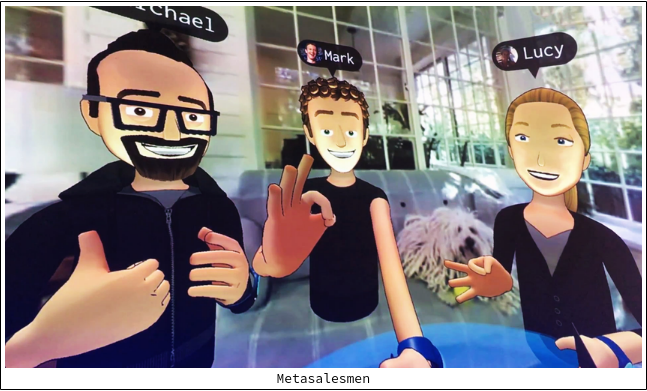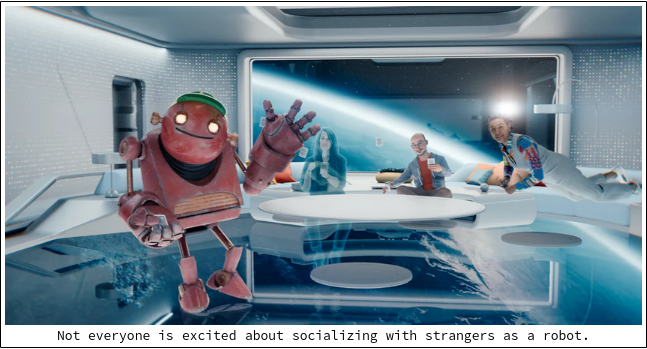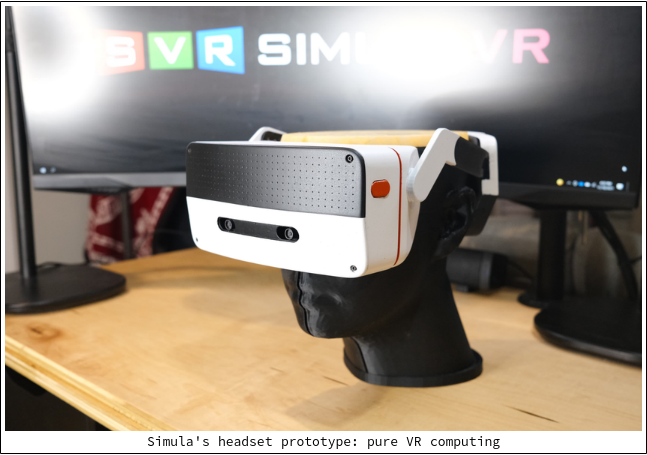This post analyzes the value proposition of the Metaverse in Zuck's own words.

While the Metaverse isn't all bad, not everyone is excited about the prospect of chatting with strangers in VR, changing their physical appearance to that of a robot, or purchasing digital avatars to keep up with the virtual Jones'. The prospect of being bombarded with virtual ads in a corporo-Metaverse™ is only tolerable if its value proposition is high enough. But Zuck, in his recent brand unveiling, mainly clarifies what the value proposition is to Facebook (specifically: a vast new marketplace of social experiences for the company to take a slice of). It's less clear what the value proposition to users is supposed to be.
The value proposition of the Metaverse, in Zuck's own words

The problem with Zuck's vision of VR is that he starts with the social and business aspects of the platform and works backwards to the user. This is exactly backwards:
-
The ability to socialize with people in VR. According to Zuck, the Facebook Metaverse is first and foremost a mechanism to get people involved in a social network. All other features are then forced through this framing:
We’re a company that focuses on connecting people. While most other tech companies focus on how people interact with technology, we focus on building technology so people can interact with each other. … Today, we are seen as a social media company, but in our DNA, we are a company that builds technology to connect people. And the metaverse is the next frontier, just like social networking was when we got started.
This includes the ability to change your physical appearance to purchasable avatars, and the ability to convey facial and physical gestures to others:
[T]here are avatars, and that’s how we’re going to represent ourselves in the metaverse. Avatars will be as common as profile pictures today … You’re going to have a wardrobe of virtual clothes for different occasions designed by different creators and from different apps and experiences.
Even your VR "Home" is something that is primarily designed to facilitate Facebook social networking!
Soon, we’re going to be introducing a social version of Home, where you can invite your friends to join you as avatars. You’ll be able to hang out, watch videos together and jump into apps together.
-
Gaming & entertainment experiences.
Now, if you ask people today what they thought the metaverse was, a lot of people would probably say it was a Spider-Man movie. But the people actually follow the space would say it’s about gaming. And that’s because gaming provides many of the most immersive experiences and it is the biggest entertainment industry by far.
This includes, in particular, social world building (again: emphasis on social), which Facebook is of course excited to monetize:
You’ll be able to hang out, watch videos together and jump into apps together. Then there is Horizon Worlds, which is where you can build worlds and jump into them with people.
Horizon is designed to make it possible for everyone to create, and we’re already seeing people build some really interesting experiences from creating new games together to throwing surprise parties and VR that family and friends around the world can join.
-
A virtual overlay of art and advertisements over the real world.
In the next year, we’re also adding the ability for creators to connect different physical locations into cohesive, augmented reality storytelling experiences like guided tours or scavenger hunts. We’re also building a horizon marketplace where creators can sell and share 3D digital items. And our hope is that this will enable a lot more commerce and help grow the overall metaverse economy.
-
The ability to work in a beautiful office, with unlimited screens, and a more intuitive hand-gesture interface. Ok – this is something we're actually excited about too. But does Zuck actually care about this the most?
Over the last year and a half, a lot of us who work in offices have gone remote. And while I miss seeing the people I work with, I think remote work is here to stay for a lot of people. So we’re going to need better tools to work together.
Zuck treats VR office almost as a necessary evil in our new remote-first world. He also treats it as something that Facebook socializing needs to conquer:
Let’s take a look at what working in the metaverse will be like. Imagine if you could be at the office without the commute, you would still have that sense of presence, shared physical space, those chance and interactions that make your day, all accessible from anywhere.
This is just the wrong framing for productive VR computing.
VR socializing, though sometimes useful, is not what's exciting about the technology
The coolest thing about VR is its impact on the way we compute, learn and think. It ought to be a Tool for the Mind, not a social network apparatus. And while it's sometimes useful to socialize while working on certain things, trying to jam the technology through the "Let's Social Network It!" prism is a recipe for uninspiring products at best, and Definite Technology Pessism at worst.
We're not offering you a Metaverse, we're offering you a productive VR computer

The Simula One is a portable Linux VR headset with office/programmer productivity as the #1 goal. It's not part of any social networking ecosystem, and will offer the following advantages over Facebook's most recent headset (Oculus Quest 2):
-
Nearly double the text quality. The Simula One features nearly double the PPD (pixels-per-degree) of the Oculus Quest 2. This is extremely important for facilitating multi-hour VR sessions without eye fatigue.
-
Proper window management. SimulaVR is a fully functional Linux window manager (built over Wayland/wlroots infrastructure). Unlike Quest virtual desktops, Simula isn't merely emulating screens on top of another host OS through WiFi. This means you get an unlimited number of windows, popups can (when desired) behave as new windows, etc. No hacks are required to get this sort of functionality.
-
Proper portability. Our headset is fully portable (with a detachable compute pack in the back), and won't require you to tether your headset to another computer over WiFi, or take along an additional laptop just to get your VR computer working somewhere else.
-
Proper hackability. Simula is built over FOSS, and is not tethered to the Facebook platform. If there's something you want to change or tweak, you're free to do so.
We still have a lot of work ahead of us to improve upon a VR-centric UX (incorporating proper window tiling, VR-centric office applications, and other VR "tools for thought"). Though we don't have the team size or resources to build a social Metaverse, we don't think this is what technology enthusiasts actually want in the first place.